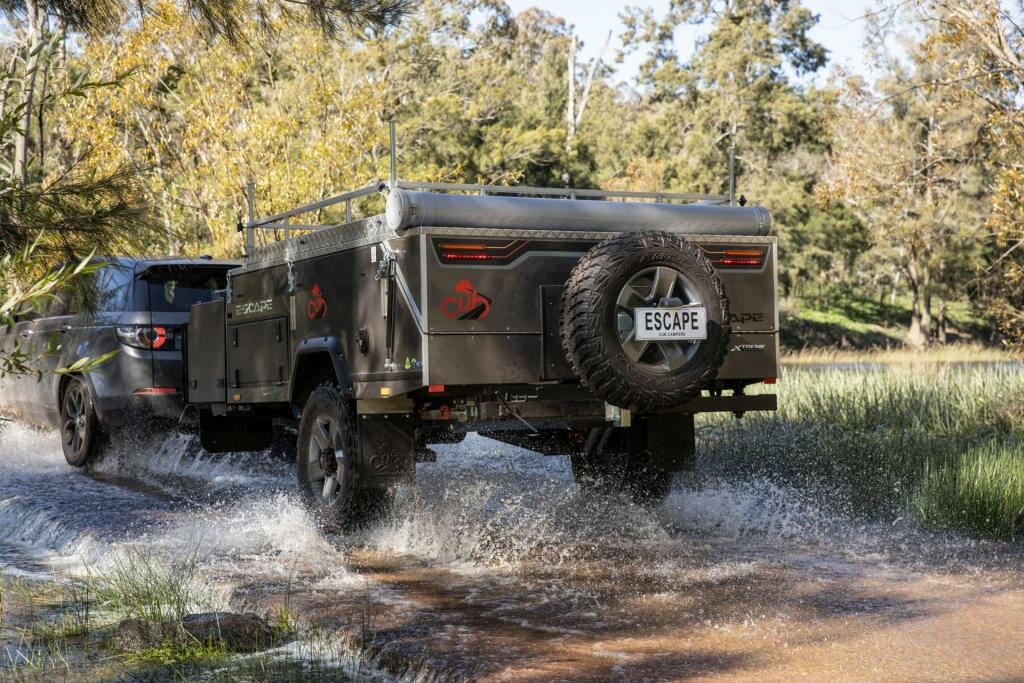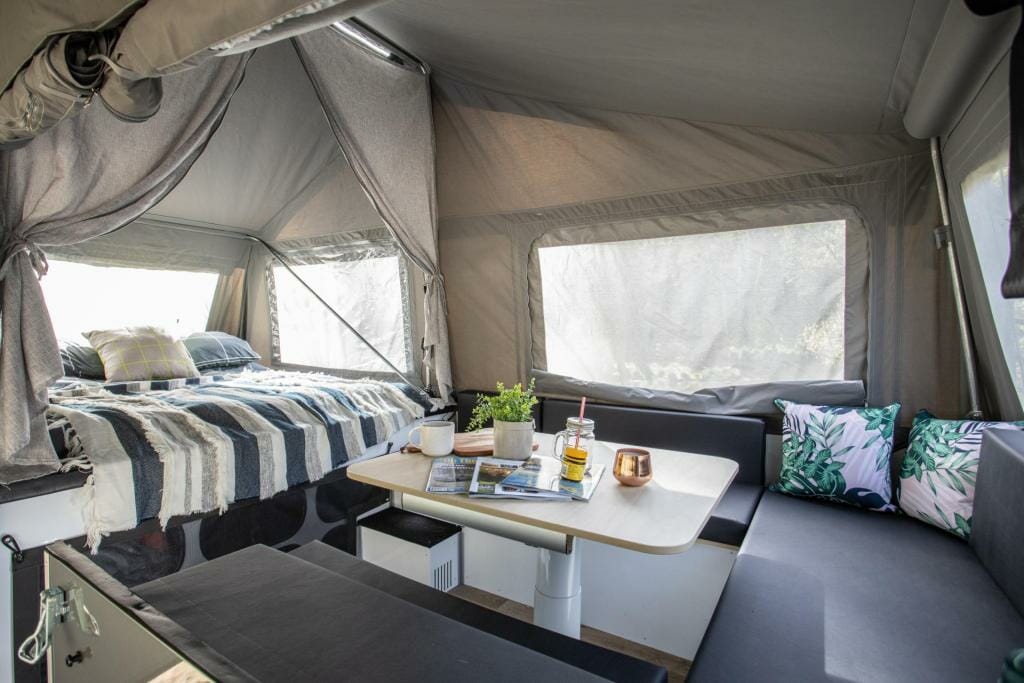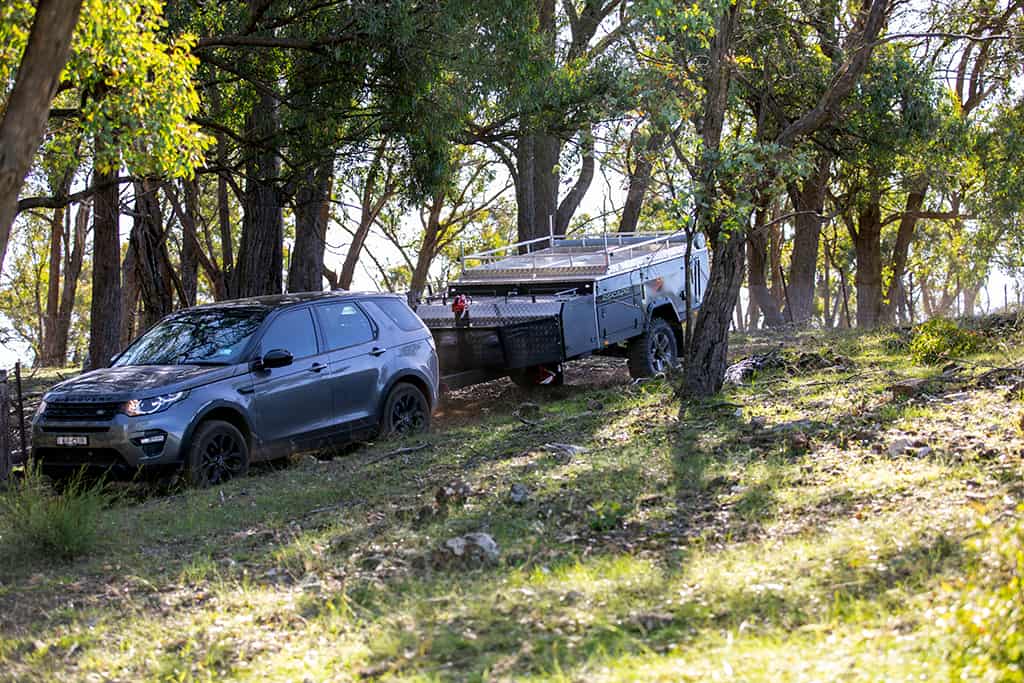With trade show season upon us, those of you who are in the market for a new camper trailer are going to be spending a considerable amount of time looking at the various models on the market. Whether you are looking to camp in caravan parks or go off road and find free campsites in remote locations, it’s important to understand what your camper trailer is capable of and which questions you should be asking when you speak to the sales staff. To put you on the right track, we’ve put together a list of things to look for and ask as you consider which camper trailer is right for you.
Towing
Firstly, make sure that your vehicle is rated to tow the camper trailer that you’re interested in. To do this, you need an understanding of the common terms that are used and compare the various weights to your vehicle’s owner’s manual to its towing capability.
Tare: This is the empty (or unloaded) weight of the camper. This accounts for the weight as the trailer is sold to you without any gas, fuel, water, luggage etc.
ATM (Aggregate Trailer Mass): This refers to the maximum that the trailer can weigh when it’s fully loaded.
Ball Weight: The vertical load applied to the tow ball of your vehicle.
There have been instances of manufacturers providing incorrect information so you will need to check that the information, such as ball weight and the tare weight, on the VIN matches the information on the brochure.
Some other important aspects of towing to take into account are to consider whether you have allowed for full water tanks, gas bottles, jerry cans and luggage for all passengers when calculating your requirements and the trailer’s capacity. You will also need to consider the size of the trailer to determine how much the wind drag on the trailer will affect your towing capability as well as how much rear vision you will have when it’s behind your vehicle.
Off road or on road
Once you have figured out what weight your vehicle can comfortably tow, you need to decide if you prefer the caravan park holiday or would rather venture off into the bush, drive though a few rivers and camp on the edge of a cliff. If you prefer a more relaxed holiday, perhaps with some light off-roading, a touring model would be your best fit. These come with lighter suspensions and smaller tyres, and although perfectly capable of tackling a few dirt roads, they are not suitable for heavy off roading.
For a more off-road adventure, you want to make sure that your camper has an appropriate off-road suspension system as well as large wheels and plenty of ground clearance to cope with rocky roads and rutted 4WD tracks. When inspecting the camper, make sure that you look underneath to check for any loose wires or hoses, as these could get caught on sticks or branches. Another aspect to consider is the amount of protection on the undercarriage and whether this protection will be sufficient for your needs.

Setting up the camper trailer
One of the major benefits of a hard floor camper trailer is how easy it is to set up compared to soft floor models. With that said, however, some of the models on the market can be trickier to set up than others. Make sure that when you speak to the sales staff, ask them to fully set up the camper so that you can see what the setup process entails. If they cut the demonstration short halfway, it could mean that the second half is much trickier than the first, so make sure you get the full demonstration. Ideally, you would want the sales staff to allow you to set one up for yourself so that you get first-hand experience with how easy or difficult it will be to set up once you’re out on your adventures.
Footprint and living space
When we refer to footprint, we are generally speaking about how much space the camper trailer occupies when it’s set up. Typically you will find that forward-fold camper trailers have a smaller footprint than rear-fold campers and are easier to fit into smaller camping spots. Rear folds, on the other hand, tend to offer a bit more living space and storage as they fold out to roughly double their length when set up. It’s also important to consider how much space you have to store your camper and choose a models that suits the size of your garage.

Quality
There are dozens of brands of camper trailers on the market and you want to ensure that the one that you choose will be able to handle the harsh Australian conditions. If the steel is of poor quality or the welding is not of a high standard, it’s unlikely to resist stress cracking and not last very long. Make sure that you ask where the steel is from and have a good look at the welds (if you aren’t sure what to look for, it helps to have a mate who works in fabrication go along with you).
The other big factor to look at is the canvas. Australia is known for its harsh climate and you want a tent that will last for years. Australian canvas is made to Australian Standards and is specified to be stabilised against ultraviolet radiation, is resistant to rot and mildew, and of course waterproof! If you’re considering Australian made, look for the tag mentioned in the video at the end of this article.
Lastly, you will need to check the quality of the dust seals. Walk around the closed camper to ensure that it is properly sealed or you could end up taking half of the dirt road that you drove on with you, which is sure to put a dampener on your holiday. In this video, Matt highlights a few things to check when looking at the seals.
Warranty
A good indication of a quality product is a solid warranty, because manufacturers that make quality products are willing to back them up with comprehensive warranties. Asking about the details of the warranty should be a key part of your buying process, especially if you plan on taking your camper off road. Based on your needs, you may not need a warranty that covers all of the following aspects, but you should decide what is right for you and ask the right questions to make sure that your needs for the camper are covered by the warranty.
– Does the warranty cover usage off road and on 4WD-only tracks?
– Can the trailer be exposed to water crossings at or above body floor level?
– Can the trailer be used on heavily-corrugated or rutted roads and tracks?
– Will the warranty cover damage caused by heavy landings or hard impact?
– What is the brand’s ability to supply spare parts as you need them?
– Is there a national service network available?

Talk to camper trailer owners and check reviews
We live in an age where social media allows us to get authentic word-of-mouth feedback on almost any product from hundreds of people without ever leaving home. There are Facebook groups that cater to almost every hobby and lifestyle on the planet, and camping is no different. Join a Facebook group or hop on a forum and ask the members what they think about the model of camper trailer that they’ve bought to get an idea of the quality and level of service they received. There are also heaps of reviews available online, on television and in magazines so make sure to get as much information as possible before making your final decision.
The video below these as well as some additional tips to consider when buying a camper trailer.
We hope that this guide has been useful and if you have any further questions, feel free to send us an email, give us a call or contact us on Facebook for more information.
